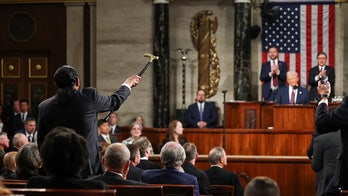Fox News Flash top headlines for Nov. 23
Fox News Flash top headlines for Nov. 23 are here. Check out what's clicking on Foxnews.com
The State Department late Friday released 100 pages of court-ordered documents that show President Trump’s personal lawyer Rudy Giuliani and Secretary of State Mike Pompeo spoke on the phone at least twice in late March within the same time frame of events currently under investigation in a House impeachment inquiry.
The correspondence between Giuliani and Pompeo was scheduled weeks before former vice president Joe Biden officially announced his candidacy in the 2020 presidential election on April 25.
The released records were linked to testimony from several key witnesses, including U.S. Ambassador to the European Union Gordon Sondland, who testified this week that senior Trump administration officials were involved in the president’s efforts to convince Ukraine to launch a probe into former Vice President Joe Biden and his son Hunter Biden’s business dealings in the country. The 100 pages also included information related to House Democrats’ claims that Giuliani launched a so-called “smear campaign” against then-U.S. Ambassador to Ukraine Marie Yovanovitch, leading to her ouster.
POMPEO DEFENDS ADMINISTRATION AMID UKRAINE CONTROVERSY: ‘IT IS OUR DUTY TO INVESTIGATE’
The documents were published by American Oversight, a nonprofit ethics watchdog investigating the Trump administration, which filed a lawsuit under the Freedom of Information Act for information related to the Trump administration’s dealings in Ukraine. The group claimed to have found a loophole in the White House’s objections to cooperating in House impeachment hearings after Congress issued a subpoena for similar information.
“That American Oversight could obtain these documents establishes that there is no legal basis for the administration to withhold them from Congress,” American Oversight Executive Director Austin Evers said in a statement. “That conclusively shows that the administration is engaged in obstruction of justice. The president and his allies should ask themselves if impeachment for obstruction is worth it if the strategy isn’t even going to be effective."
Trump administration officials declining to testify on Capitol Hill have included acting White House Chief of Staff Mick Mulvaney; John Eisenberg, the lead attorney for the National Security Council; Robert Blair, a top aide to Mulvaney; Michael Ellis, a National Security Council aide; and Brian McCormack, an Office of Management and Budget aide.
Included in the documents were records of a March 27 email exchange in which Trump’s former assistant Madeleine Westerhout helped put Giuliani’s team in touch with Pompeo after Giuliani’s assistant said she had "been trying and getting nowhere through regular channels," according to a copy of the documents supplied to Fox News after the nonprofit’s website crashed. Westerhout emailed an unnamed State Department official for contact information for “S,” a reference to Pompeo. She eventually sent the phone number to Giuliani’s assistant after the State Department official responded.
The emails appeared to back up at least some of Sondland’s claims that many top officials were involved, at the “express direction” of the president, in his request for the Biden probe, as well as information about the hacking of the DNC server in 2016. During his hearing Wednesday, the ambassador reneged in his original testimony and, instead, affirmed that there was an explicit trade of U.S. military aid to Ukraine tied in exchange for political favors.
“Was there a ‘quid pro quo?’ Sondland said. “The answer is yes.”
“Everyone was in the loop. It was no secret," he added.
Also during Wednesday's hearing, Republican lawmakers confirmed that Sondland only "presumed," and was never told directly, that the aid to Ukraine was held in lieu of investigating the Bidens or 2016 election interference. Sondland's testimony also revealed that Trump had told the ambassador he wanted nothing from Ukraine and there was no quid pro quo.
The documents also supported testimony from U.S. diplomat David Hale who told the House Intelligence Committee that Pompeo and Giuliani spoke on the phone twice in late March. The records showed that Giuliani and Pompeo were scheduled to speak on the phone once on March 26, before the email exchange, and again on March 29. The topics of conversation were not listed. Pompeo also was scheduled to speak with Rep. Devin Nunes, R-Calif., on April 1. The ranking member of the House Intelligence Committee has sharply defended Trump throughout impeachment hearings.
“It was designed to produce a specific storyline to be pushed forward by the Democrats and their supporters in the media,” Nunes said Thursday about the hearings.
These conversations occurred around the same time Yovanovitch was called back to Washington in early April before she was eventually fired in May. The career diplomat, who has served both Republican and Democratic presidents, testified last week that she was “kneecapped” by the Trump administration in her efforts to fight corruption in Ukraine. She also said she believed Giuliani played a key role in telling people she was not sufficiently supportive of the president.
Friday’s statement from American Oversight also tied the documents to what they called Giuliani’s “smear campaign” against the ambassador.
CLICK HERE FOR THE ALL-NEW FOXBUSINESS.COM
“We can see why Mike Pompeo has refused to release this information to Congress. It reveals a clear paper trail from Rudy Giuliani to the Oval Office to Secretary Pompeo to facilitate Giuliani’s smear campaign against a U.S. ambassador,” the statement said.
Also included in the documents was an April 5 letter penned by six former U.S. ambassadors to Ukraine – including impeachment witness Bill Taylor – expressing concern over “recent uncorroborated allegations” questioning Yovanovitch’s work at the U.S. Embassy in Kiev. The ambassadors said the claims against Yovanovitch stemmed from a letter written by Pompeo and sent to Trump last May.
Fox News’ Rich Edson, Adam Shaw, Alex Pappas and Andrew O’Reilly contributed to this report.













































